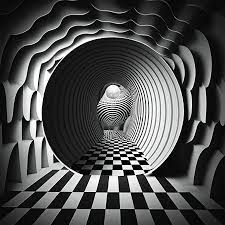
Derealisation, a mental state that can make the world seem dreamlike and disconnected, is a phenomenon that many may not fully comprehend. It’s like navigating life in a haze, where grasping the reality of your surroundings becomes challenging. This state can even lead to feeling emotionally detached from loved ones, while everything around you appears colorless and blurry.
But what exactly is derealisation? Let’s dive into its intricacies and explore the signs to watch out for.
Defining Derealisation
Derealisation, in essence, is a mental state that causes individuals to dissociate from their bodies and the world around them. It can feel as though you’re trapped in a dream, with a tenuous hold on the events unfolding in your life. To shed light on this often-misunderstood phenomenon, therapist Maythal Eshaghian notes a connection between derealisation and Obsessive-Compulsive Disorder (OCD). People with OCD, who experience extended periods of anxiety and stress, can find themselves susceptible to derealisation.
Signs of Derealisation
To recognize derealisation, it’s essential to be aware of the signs it presents:
- Disconnected from Others: You may feel an overwhelming sense of disconnection from the people around you. It’s as if the bonds that once tied you to them have frayed.
- Unreal Surroundings: Derealisation often leads to a belief that your surroundings are unreal. The world takes on an otherworldly quality, resembling a dream more than reality.
- Watching Ourselves as a Third Person: In this state, we may dissociate from our own bodies and lives. It’s as if you’re observing your existence from the perspective of a third person, watching your life unfold like a movie.
- Dissociation from the Body: A common symptom is feeling disconnected from your physical body. You might experience a sensation of floating and a lack of control over your physical state.
- Altered Perception of Time: Time itself can become a nebulous concept during derealisation. You might feel like it’s racing by or dragging on endlessly, and the objects around you may appear distorted and blurry.
Coping with Derealisation
Dealing with derealisation can be challenging, but there are strategies to help you navigate this mental state:
- Understanding as a Defense Mechanism: Acknowledge that derealisation, though unsettling, can be a defense mechanism. It’s a way for your mind and body to shield themselves from heightened distress or anxiety.
- Waiting for It to Pass: Instead of battling these thoughts, try distraction. Engage with activities and people that bring comfort, as derealisation symptoms often dissipate over time.
Derealisation may indeed feel like an unsettling journey into the surreal, but with understanding and effective coping strategies, you can navigate through it. Remember, it’s a state that, though daunting, can be managed, allowing you to regain a firmer grasp on reality when the time is right.